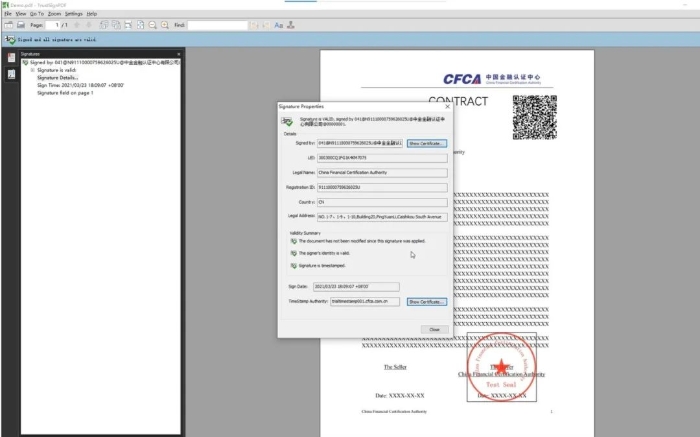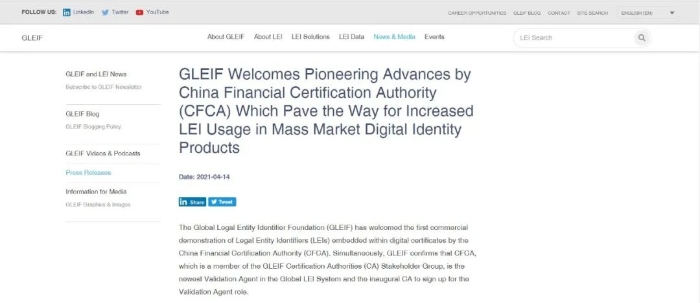什么是LEI与GLEIF?
LEI即全球法人机构识别编码,全称Legal Entity Identifier,是由金融稳定理事会(FSB)推动构建的20位数字字符代码。LEI连接关键参考信息,便于清楚唯一识别参与金融交易的法人机构。
GLEIF(Global Legal Entity Identifier Foundation)由金融稳定理事会于2014年6月成立,旨在支持法人机构识别编码 (LEI)的实施与应用。
我国如何推进LEI赋码与应用?
2020年12月,中国人民银行会同银保监会、证监会、外汇局发布《全球法人识别编码应用实施路线图(2020-2022年)》(银发〔2020〕283号),明确我国推进LEI应用实施的意义、目标和原则,并就应用规则制定、LEI赋码、技术应用和场景建设、可持续运营等方面提出具体工作任务和分工。
截至2022年3月底,中国境内LEI持码机构超7.5万家,是近年增速最快的国家。
CFCA如何参与LEI体系国际合作?
2021年3月11日,全球法人机构识别编码基金会(GLEIF)官宣成立GLEIF CA群组(CA Stakeholder Group)。当日,中国金融认证中心(CFCA)通过审核,正式成为加入GLEIF CA群组的第一家中国CA机构。4月14日,CFCA再次通过GLEIF审核,正式成为全球法人机构识别编码(LEI)体系的验证代理机构,也是首个注册验证代理角色的CA。
在加入GLEIF CA群组的一年当中,CFCA大力推广数字证书中嵌入LEI的应用,按照中国人民银行会同市场监管总局、银保监会、证监会联合印发的《金融标准化“十四五”发展规划》的要求和指引,深耕跨境数字身份服务的应用,积极参与LEI体系国际合作,联合合作伙伴完善跨境数字身份生态,加快推进LEI在中欧跨境商务等场景、可验证LEI(vLEI)等项目中落地应用。
未来,CFCA致力于完善跨境数字身份认证服务基础设施,推出更多细分产品,解决跨境认证相关行业痛点。助力客户建立可靠、可信且国际认可的跨境数字身份,参与全球数字经济发展大局。
了解更多
CFCA promotes the application of LEI in digital identity to facilitate financial standardization
Financial Standardization continues to be enhanced in China
In January 2022, the People's Bank of China, the State Administration for Market Regulation, the China Banking and Insurance Regulatory Commission, and the China Securities Regulatory Commission jointly published "The 14th Five-Year Plan for Financial Standardization Development" (hereinafter referred to as "The Plan"). The Plan pinpoints the goal of establishing a financial standards system compatible with the modern finance system by 2025. And by then, the economic benefits, social benefits, quality benefits, and ecological benefits of financial standardization will be fully manifested, and the role and value of standardization in supporting the high-quality development of the financial industry will be more prominent.
The Plan has identified seven key aspects: one of which is to strengthen the opening up of financial standardization. This chapter specifies the goal to accelerate the transformation and application of popular and mainstream international financial standards. Specifically, vigorously promote the application of Legal Entity Identifier (LEI) in financial risk monitoring, cross-border legal entity digital identification, cross-border payment, and other cross-border transaction scenarios, and appropriately coordinate and map LEI to Unified Social Credit Identifier (enterprise identifier issued by Chinese business registry). Build cross-border legal entity information services platform and digital authentication platform to improve the ability of sustainable operations. Promote the integral application and ecosystem construction of LEI with digital certificates, LEI with verifiable credentials to further strengthen the support for digital business.
CFCA commits to facilitating the application of LEI
CFCA as one of the initial members of GLEIF (Global Legal Entity Identifier Foundation) Certificate Authority (CA) Stakeholder Group, and the inaugural CA to act as a LEI Validation Agent, has engaged together with NIFS (the Local Operating Unit of LEI system in China) on the registration and issuance of around a hundred LEIs to entities based in China as a pilot. In 2021 CFCA and NIFS has signed a strategic collaboration agreement to accelerate the issuance and application of LEI in China. The partnership enables customers of CFCA, such as banks, to obtain LEIs easily and include them within business processes: or act as a proxy to register LEIs for their clients if bank business requires. Simultaneously, CFCA works closely with GLEIF and NIFS to establish a role as LEI Validation Agent.
Meanwhile, CFCA is dedicated to promoting the application of embedding LEI into digital certificates. CFCA has been actively pursuing innovation integration of LEI and our digital products and consequently became the first market participant to successfully demonstrate a commercial use case of LEIs being embedded in a digital certificate. CFCA can provide clients with trust services including issuance of digital identity based on LEI, identity authentication, electronic seal, electronic signature, and other information security services. Whether clients have already owned a LEI or not, CFCA can provide a one-stop service for digital certificates in compliance with ISO Standard 17442-2 (Financial services — Legal entity identifier (LEI) — Part 2: Application in digital certificates). Related products catalyzed the adoption of ISO 20022 standard in cross-border payment systems. CFCA cooperated with industry partners to upgrade the Register Authority (RA) System for certificate authorities, so that every newly issued digital certificate has the entity’s LEI information embedded within. By January 2022, more than 1,100 digital certificates with LEI information have been issued to support cross-border payments.
Furthermore, CFCA is eager to explore more scenarios using digital certificate products with LEI embedded. CFCA partnered with GLEIF and InfoCert SpA to initiate a pilot on cross-border commerce and E-contract between China and Europe, and framed another pilot in cross-border logistics in the Greater Bay Area in China.


Benefits and challenges
The digitalization of LEI will further encourage the advantages of LEI in the global digitalization stage. A Legal Entity Identifier (LEI) is an ISO-standardized 20-character code that uniquely identifies a legally registered organization, or ‘legal entity’. It enables anyone, anywhere in the world to trust that an organization is who it claims to be. Each LEI is unique and can represent only one legal entity. Each LEI links to a corresponding ‘LEI record’ which contains a range of identifying information about the legal entity, such as its registered location, legal name, and ownership structure.
The information and reference data of legal entities with LEI are publicly available in the Global LEI Index and thus can affirm the genuine existence of the legal entity with global trust and facilitate the retrieval of accurate and reliable reference data. Research conducted by McKinsey has concluded that broader adoption of LEI will reinforce the efficiency of KYC in banking and could save the global banking sector U.S.$2-4 billion annually in client onboarding costs alone . The innovative digital identity based on LEI, with the characteristics of being verifiable, traceable, secure, and flexible, can serve a variety of digital economic scenarios, including E-transactions and E-contracts signing, customer login verification, import and export trade, supply chain management, regulatory document reporting, etc. Through the combination of privacy computing technology and digital identity, the protection on data privacy and prevention from fraud and data abuse during identity authentication will be enhanced. Moreover, various international organizations such as the International Chamber of Commerce and the United Nations Statistical Office have also encouraged the adoption of LEI as the identity basis of digital strategy. It is anticipated that the LEI will become a ‘digital passport’ for legal entities to take business globally.
Although the application of digital certificates with LEI is proved to be a successful innovation to support digital business, a few challenges remain to be addressed. Firstly, the lifespan of the digital certificate must be synchronized with that of the corresponding LEI, and that in practice may increase the complexity of application and management. Secondly, mutual recognition and verification across different jurisdictions may encounter legal barriers. A digital certificate issued in one country under a local scheme might not be usable/recognized in another country or context, limiting the interoperability and adoption in a wider scope. Thirdly, the acceptance and credibility of such products rely on the widespread coverage of LEI. The rise in LEI users will foster the emergence of more like products and use cases. GLEIF has been exploring a series of approaches to cope with the challenges and recently has introduced the pioneering verifiable LEI (vLEI). This approach can interoperate seamlessly and securely with all technology models, including blockchain, cloud services and APIs, by adopting a ‘network of networks’ approach. The vLEI offers a digitally trustworthy version of the LEI which allows automated entity verification without the need for human intervention. Through the vLEI, GLEIF will become the guardian of a decentralized system capable of establishing digital trust for legal entities and the persons who act on their behalf either in official or functional roles.
CFCA will keep working closely with GLEIF to eliminate the hurdles and enhance user experience consistently.
Future Outlook
In the future, CFCA will continue to devote expertise to the application of cross-border digital identity services following the requirements and guidelines of The Plan, to actively participate in international cooperation in the LEI system, to work with partners to expand the cross-border digital identity ecosystem, and to accelerate the application of LEI in use cases such as cross-border commerce between China and Europe, cross-border trade in Asia-pacific area, and in the use of the verifiable LEI. As CFCA targets to be a competitive technology solution and trust service provider with a focus on digital security, we will improve cross-border digital identity authentication service infrastructure, enrich our product lines, and solve the pain points of cross-border authentication. We aim to empower clients with reliable, globally recognized, and trusted cross-border digital identities so that they can participate in the global digital economy with more convenience.
责任编辑:韩希宇
免责声明:
中国电子银行网发布的专栏、投稿以及征文相关文章,其文字、图片、视频均来源于作者投稿或转载自相关作品方;如涉及未经许可使用作品的问题,请您优先联系我们(联系邮箱:cebnet@cfca.com.cn,电话:400-880-9888),我们会第一时间核实,谢谢配合。







